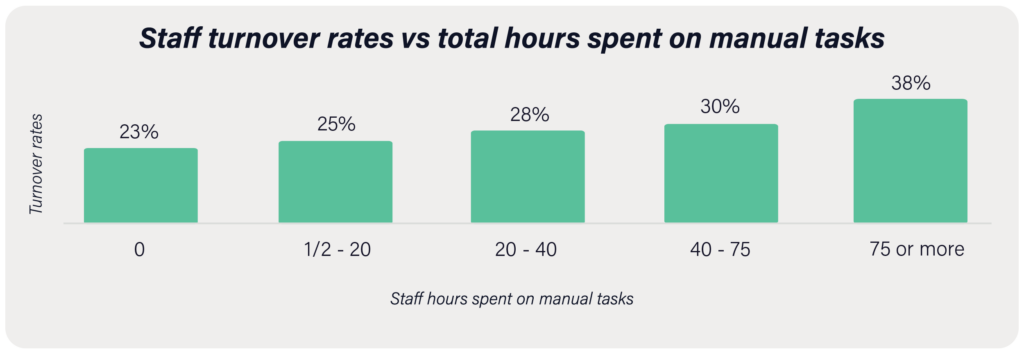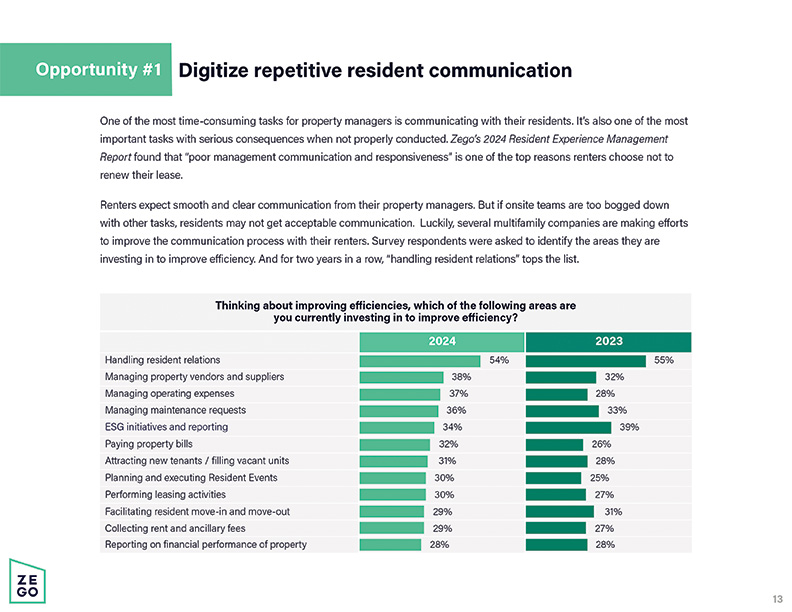How to optimize property management with 3 resident-focused strategies
Discover three resident-focused tactics to optimize property management operations and efficiency.
Thanks to sweeping rent hikes across the nation, many renters have increased expectations of their apartment community. And property management companies are not living up to renters’ standards. Ultimately, that impacts retention rates. Residents who feel like they aren’t receiving good customer service are likely to move somewhere else.
This is why your strategies for optimizing your property management communities should focus around resident interactions. Refining these touchpoints offers a better resident experience while also improving back-end operations.
Here are three resident-focused ways to optimize property management operations at your community:
- Improve staff retention
- Utilize PropTech for property management workloads
- Better resident communication
#1: Improve staff retention for streamlined property management
Staff happiness may not be the first thing that springs to mind when you’re trying to improve property management tasks efficiency. But in fact, it’s a critical part of maintaining efficient operations. Why?
One of the top reasons renters leave a community is because of poor customer service. It’s hard to provide renters good customer service when communities are short staffed or when your team members are burnt out.
Staff turnover not only drives renter turnover, but significant costs and labor too
Resident turnover creates significant costs and work for property management companies. This can be minimized by keeping team members happy. In fact, research shows that companies with higher staff turnover also see higher-than-average renter turnover, too.

In 2023, companies with staff turnover lower than 20% see an average resident retention rate of 60%. Compare that to a 54% resident retention rate for companies who have staff turnover more than 20%. This is why staff happiness is an important part of optimizing property management.
To optimize property management operations, many companies are relying on automation. This lessens workloads for employees, giving them more bandwidth to cater to residents. At the same time, automation improves operational efficiencies.
#2: Optimize property management workloads with PropTech
Your on-site teams play a critical role in renter happiness and retention. Unfortunately, companies are struggling to keep employees on payroll. So how can communities accomplish more with less, while delivering a good value to renters?
One way is to utilize PropTech solutions to lower workloads for your team members. Research shows that companies with higher turnover rates are the ones where employees spend the most time performing manual administrative tasks. In other words, the less time they have to spend on mundane tasks, the more likely they are to (happily) work at your community.

Improving efficiency and minimizing the amount of repetitive tasks is critical for boosting employee happiness and motivation. Not only that, but the more hours teams spend on routine, manual tasks creates a higher likelihood that they’ll quit.
Staff turnover not only costs you in terms of hiring costs, but it trickles down to resident turnover. That’s where the consequences of staff turnover really hurts. Our prior research shows that the cost to lose a single resident is approximately $4,000!
Employees are frustrated with repetitive tasks
As staff members are consumed more with paperwork and mundane tasks, the less fulfilling their jobs may seem. Especially when day after day it derails their focus from the true objective of their roles: building relationships with residents. An endless cycle of unrewarding tasks and falling behind becomes discouraging. And for many, it’s enough of a reason to move on to a new job.
This scenario doesn’t apply solely to multifamily either. A study by Salesforce across various fields finds that 89% of workers became happier after automation replaced mundane aspects of their job.
Automation is usually discussed in terms of the ways it optimizes property management. But employees also benefit when manual tasks are eliminated from their to-do lists. Automation tackles the tasks that lead to burnout and allows people to concentrate on work that fulfills them.


OPERATIONAL INSIGHTS
2025 Property Management Operations Report
With survey data from over 600 property operators, this study analyzes how multifamily operators are managing their community operations and identifies key opportunities for improving your multifamily operational efficiency.
#3: Elevate resident communications for efficient property management
Several tasks are required to run an apartment community. Do you know what takes up the most time for on-site teams?
Survey respondents in Zego’s Property Management Operations Report says that “communicating with residents” consumes most of their time. The average team member spends 11 hours per month on this necessity.

Clear and consistent communication throughout the resident lifecycle is key to retaining renters. So it’s a good sign that this is where associates are spending most of their time.
However, “communicating with residents” is broad. It encompasses everything from valuable interactions with renters like customer service, problem solving, etc. But routine correspondence is also a large part, too. That involves time-consuming tasks like sending updates about the community, informing renters of a package, handling maintenance requests, etc.
Routine correspondence can be a drag on multifamily property manager productivity. So this is a great area to optimize property management. Communication platforms will automate some of the notifications that really add up during the workday. This gives on-site managers more time for face-to-face interactions with renters.
Technology platforms balance automation and personal touch
Apartment communities thrive when there’s a good cadence between on-site teams and residents. So it’s not recommended to automate every instance of resident interaction. After all, some level of human touch is essential for good customer service.
But using technology to automate or streamline some touchpoints gives renters faster turnaround time on their requests, improving the overall service they receive. At the same time, on-site associates are relieved of sending constant updates and can focus on more complicated matters where automation isn’t as helpful.
Automate your property management operations
If you’re feeling like there’s a more efficient way to operate property operations, you’re not alone. Learn how Zego can help you get more done with less effort leading you to increase NOI.